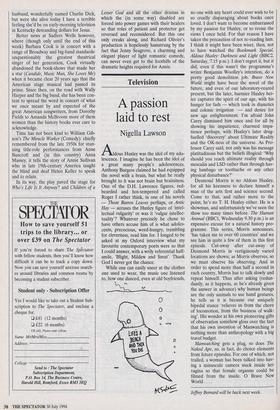Television
A passion laid to rest
Nigella Lawson
Adous Huxley was the idol of my ado- lescence. I imagine he has been the idol of a great many people's adolescences. Anthony Burgess claimed he had equipped the novel with a brain, but what he really brought to it was not brain but braininess. One of the D.H. Lawrence figures, red- bearded and hot-tempered and called Roger I rather think, in one of his novels — Those Barren Leaves perhaps, or Antic Hay — accuses the Huxley figure of 'intel- lectual vulgarity' or was it 'vulgar intellec- tuality'? Whatever precisely he chose to have others accuse him of is what adoles- cents, precocious, word-hungry, trembling for cleverness, read him for. I longed to be asked at my Oxford interview what my favourite contemporary poets were so that I could answer, with a wrily referential half- smile, 'Blight, Mildew and Smut'. Thank God I never got the chance.
While one can easily sneer at the clothes one used to wear, the music one listened to, how one danced, even at old boyfriends, no one with any heart could ever wish to be so cruelly disparaging about books once loved. I don't want to become embarrassed by my passion for Huxley, or to revise the views I once held. For that reason I have taken the precaution of not re-reading him. I think it might have been wiser, then, not to have watched the Bookmark Special, Aldous Huxley: Darkness and Light (BBC2, Saturday, 7.15 p.m.). I don't regret it, but it did, even if this wasn't the programme's writer Benjamin Woolley's intention, do a pretty good demolition job. Brave New World might have been the novel of the future, and even of our laboratory-reared present, but the later, barmier Huxley bet- ter captures the spirit of our age, with his hunger for fads — which took in dianetics and colonic irrigation — and desire for new age enlightenment. I'm afraid John Carey dismissed him once and for all by showing his impatience, charmed impa- tience perhaps, with Huxley's later drug- fuelled 'discovery' about Ultimate Reality and the OK-ness of the universe. As Pro- fessor Carey said, not only was his message platitudinous but the beliefs illogical: 'Why should you reach ultimate reality through mesca lin and LSD rather than through hav- ing lumbago or toothache or any other physical disturbance?'
Desmond Morris is no Aldous Huxley, for all his keenness to declare himself a man of the arts first and science second. Come to that, and rather more to the point, he's no T. H. Huxley either. He is a showman, and unfortunately we've seen the show too many times before. The Human Animal (BBC1, Wednesday 9.30 p.m.) is an expensive excuse for a natural history pro- gramme. This series, Morris announces, `has taken me to over 60 countries' and we see him in quite a few of them in this first episode. Cut-away after cut-away of Desmond Morris in vertiginously varied locations are shown; as Morris observes, so we must observe his observing. And in order to spend more than half a second in each country, Morris has to talk slowly and repeat himself. Thus after asking (redun- dantly, as it happens, as he's already given the answer in advance) why human beings are the only animals to use hand gestures, he tells us it is because our uniquely bipedal stance 'relieves us from the chore of locomotion, from the business of walk- ing'. His wonder at his own pioneering gifts of observation somehow gloss over the fact that his own invention of Manwatching is nothing more than anthropology with a big travel budget.
Manwatching gets a plug, so does The Naked Ape, so, in fact, do choice elements from future episodes. For one of which, not trailed, a woman has been talked into hav- ing a minuscule camera stuck inside her vagina so that female orgasms could be filmed from the inside. 0 Brave New World


















































 Previous page
Previous page